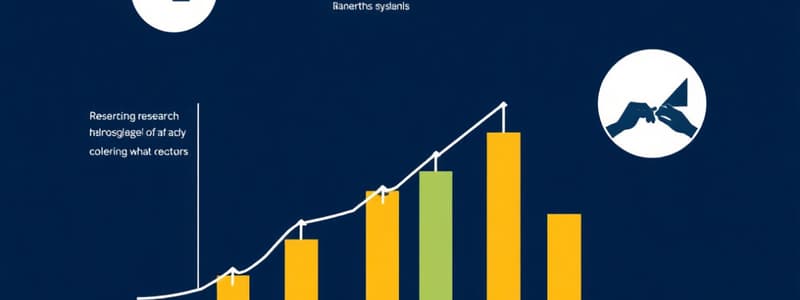Podcast
Questions and Answers
Which research method is best for gathering quantitative data from a large group?
Which research method is best for gathering quantitative data from a large group?
- Focus groups
- Questionnaires and surveys (correct)
- Interviews
- Observation
What type of data is primarily gathered through interviews?
What type of data is primarily gathered through interviews?
- Numerical data
- Statistical data
- Qualitative data (correct)
- Experimental data
Which research method involves discussions with small groups to explore various viewpoints on a specific topic?
Which research method involves discussions with small groups to explore various viewpoints on a specific topic?
- Observations
- Focus groups (correct)
- Surveys
- Experiments
What is the primary purpose of experiments in research?
What is the primary purpose of experiments in research?
Which research method involves watching and recording events without interference?
Which research method involves watching and recording events without interference?
In which scenario would using observation be most beneficial?
In which scenario would using observation be most beneficial?
Why might a researcher choose to use a combination of research methods for a management project?
Why might a researcher choose to use a combination of research methods for a management project?
What is a key benefit of using interviews over questionnaires in research?
What is a key benefit of using interviews over questionnaires in research?
Flashcards
Questionnaires and Surveys
Questionnaires and Surveys
A technique for collecting data from large groups using pre-determined questions. It's ideal for quantifying opinions or trends, like customer satisfaction.
Interviews
Interviews
A qualitative research method involving structured conversations with individuals. It aims to delve into personal experiences, opinions, and motivations.
Focus Groups
Focus Groups
A group discussion facilitated by a moderator. It allows for diverse viewpoints and collective attitudes to emerge on a specific topic.
Experiments
Experiments
Signup and view all the flashcards
Observation
Observation
Signup and view all the flashcards
Combined Research Methods
Combined Research Methods
Signup and view all the flashcards
Selecting and Implementing Research Methods
Selecting and Implementing Research Methods
Signup and view all the flashcards
Study Notes
CMI Level 5 - Conducting a Management Project - Learning Outcome 1.3
- Research methods are crucial to gathering accurate and relevant data in management projects.
- The chosen methods depend on research objectives, data needs, and available resources.
- Questionnaires and surveys are effective for gathering quantitative data from large groups, such as customer satisfaction or employee feedback. These methods provide measurable insights and trends.
- Interviews are qualitative methods allowing investigation of individual experiences, attitudes and motivations.
- Focus groups involve small, diverse groups discussing specific topics or issues, providing varied perspectives and collective attitudes.
- Experiments are valuable for testing hypotheses and assessing the effects of variables, especially in controlled environments.
- Observation involves systematically watching and recording behaviours in natural settings, useful for understanding real-world processes and interactions.
- Each method has strengths and can be used alone or in combination.
- Appropriate research methods ensure data is robust, reliable, and relevant to objectives.
- Method selection depends on numerous factors.
Defining Research Objectives
- Clearly defined aims of the research are vital in determining the necessary data type.
- Objectives determine whether the data will be qualitative, quantitative, or a combination.
Understanding Research Context
- Consider industry, target population, resources available.
- Contextual factors influence the suitability and practicality of various methods.
Choosing Data Collection Methods
- Choose methods appropriate to research objectives and context.
- Surveys/experiments suited to gathering quantitative data.
- Interviews/focus groups/observation suited to gathering qualitative data.
Determining Sampling Techniques
- Decide on appropriate sampling techniques (e.g., random, purposive) to ensure representative data for the research.
Planning Data Collection
- Create a detailed plan incorporating timelines, tools, personnel, and ethical considerations like informed consent. Data confidentiality is also critical.
Pilot Testing
- Conduct pilot tests to identify potential issues with chosen methods.
- Making adjustments to enhance effectiveness of chosen methods.
Implementation
- Execute research utilizing selected methods, ensuring consistency and reliability during the data collection process.
Studying That Suits You
Use AI to generate personalized quizzes and flashcards to suit your learning preferences.




